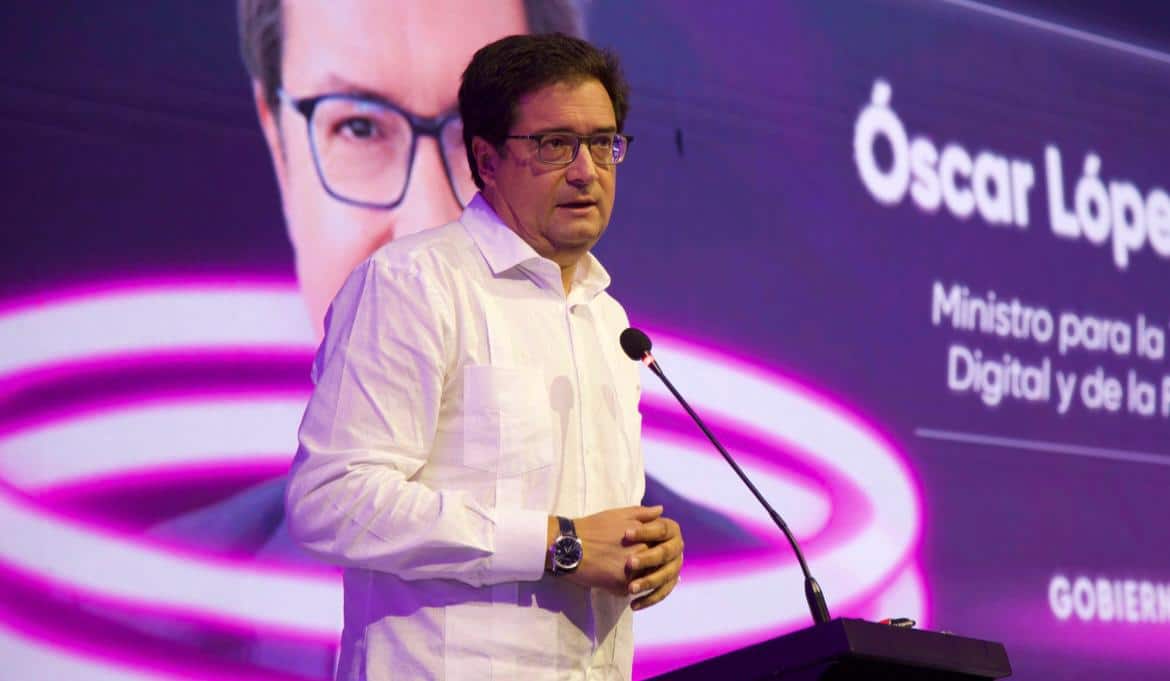Spain aims to lead, alongside Latin America, the global debate on citizens’ rights in the digital environment. This was emphasized by the Minister for Digital Transformation and the Civil Service, Óscar López, during the launch of the Digital Rights Observatory, held as part of the Andicom Congress in Cartagena de Indias.
The proposal comes at a pivotal moment marked by the expansion of artificial intelligence (AI), misinformation, and growing concerns over privacy and internet security. “The digital revolution entails cracks and opportunities. Europe and Ibero-America must take a stand and raise their own voice,” López highlighted.
An Observatory with an International Outlook
The Digital Rights Observatory, driven by Red.es and in collaboration with 19 entities from the technological, academic, and social spheres, has a clear goal: to adapt fundamental rights to the digital world. Its mission is to raise awareness, disseminate, and ensure the implementation of the Digital Rights Charter approved in Spain in 2021, as well as to promote similar public policies and commitments in other countries.
The program has a budget of €10.83 million, financed 80% by NextGenerationEU European funds, involving over 150 entities and 360 experts.
Background: From Spain to the EU and Ibero-America
Spain was a pioneer in 2021 with the approval of its own Digital Rights Charter, a framework recognizing rights such as privacy, data protection, freedom of expression, and internet access as essential elements of democracy in the digital age.
This path was followed by the European Union in 2022 with the EU Digital Rights and Principles Declaration, and later by the Ibero-American Summit of Heads of State and Government in 2023, where the Ibero-American Digital Rights Charter was adopted.
With the new observatory, Spain seeks to consolidate this movement and extend it to Latin America, a region where digital inequality and misinformation pose urgent challenges.
Disinformation and Childhood Among the Major Challenges
During the event, experts from various fields agreed that digitalization, without a human-centered approach, can perpetuate inequalities and generate risks. Topics discussed included:
- Misinformation and fake news, which threaten democracies.
- Protecting children in digital environments, increasingly exposed to risks such as cyberbullying or misuse of data.
- Privacy and security of personal data.
- Technological ethics, especially in the context of AI use in public and private processes.
“The challenge is not just technological; it is social, political, and cultural,” stated Carolina Botero, director of the Karisma Foundation.
Voices from the Region
The event featured key figures such as Jaime Abello, director general of the Gabo Foundation, former Secretary of State for Digitalization and AI Carme Artigas, and representatives from Colombia and other Ibero-American countries.
All concurred that digital rights are the logical extension of human rights into the virtual world, and that protecting them is essential to preserve democracy and social harmony in the 21st century.
Spain as a Bridge Between Europe and Latin America
Through this initiative, the Spanish government seeks to strengthen its role as a bridge between Europe and Latin America in the digital sphere. The strategy involves coordinating efforts in rights protection, as well as digital training, technological cooperation, and innovation promotion.
“If a revolution does not expand rights, it is not truly a revolution,” concluded Óscar López, emphasizing the need for digitalization to broaden citizens’ opportunities rather than restrict them.
A Global Challenge with Local Impact
Digitalization today is a driver of economic and social growth, but also a field of geopolitical contest. Spain’s proposed alliance with Latin America aims to balance the international debate, traditionally dominated by the United States and China, and to place individuals’ protection at the center.
The goal is ambitious: to ensure that rights such as privacy, equality, internet access, and non-discrimination are upheld with the same efficacy in the digital realm as in the physical world.
Frequently Asked Questions (FAQs)
What are digital rights?
They are the extension of fundamental rights (privacy, freedom of expression, equality, etc.) into the digital environment, ensuring their enforcement online and with new technologies.
What is the Digital Rights Observatory?
It is a Spanish public-private initiative aimed at promoting, protecting, and implementing digital rights, with an international focus and special attention to Latin America.
Why does Spain want to lead this agenda?
Spain was a pioneer with its Digital Rights Charter (2021) and seeks to establish a human-centered and sustainable vision of digital transformation, in collaboration with Europe and Latin America.
What role does AI play in this debate?
AI raises challenges related to privacy, ethics, and data control. The Ibero-American alliance seeks to ensure its use aligns with democratic values and fundamental rights.
📌 Sources: Ministry for Digital Transformation and the Civil Service (Government of Spain), Red.es, Digital Rights Charter (2021), EU Digital Rights Declaration (2022), Ibero-American Digital Rights Charter (2023).

